|
|
|
Sort Order |
|
|
|
Items / Page
|
|
|
|
|
|
|
| Srl | Item |
| 1 |
ID:
101748
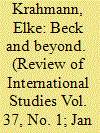

|
|
|
|
|
| Publication |
2011.
|
| Summary/Abstract |
Expanding on the works of Beck and others on the growing business of risk, this article examines the role of the private security industry in the creation, management and perpetuation of the world risk society. It observes that the replacement of the concept of security with risk over the past decades has permitted private firms to identify a growing range of unknown and unknown-unknown dangers which cannot be eliminated, but require permanent risk management. Using the discourse of risk and its strategies of commercialised, individualised and reactive risk management, the private risk industry thus has contributed to the rise of a world risk society in which the demand for security can never be satisfied and guarantees continuous profits.
|
|
|
|
|
|
|
|
|
|
|
|
|
|
|
|
| 2 |
ID:
101752
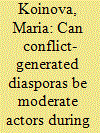

|
|
|
|
|
| Publication |
2011.
|
| Summary/Abstract |
Conflict-generated diasporas are considered likely to maintain radical behaviours. This article seeks to explain why and how they nevertheless adopt moderate claims, especially when advocating highly sensitive issues such as state sovereignty. Focusing on groups in the US I investigate the Lebanese diaspora linked to the pro-sovereignty movement in Lebanon (2000-2005) and the Albanian diaspora linked to Kosovo's independence movement (1999-2008). The contentious episodes take place during the original homeland's post-conflict reconstruction. Embedded in the literatures on diasporas, conflicts, and transnational social movements, this article argues that instrumental approach towards the achievement of sovereignty explains why conflict-generated diasporas adopt moderate behaviours. Diasporas hope that by linking their claims to a global political opportunity structure of 'liberalism' they 'play the game' of the international community interested in promoting the liberal paradigm, and thus expect to obtain its support for the legitimisation of their pro-sovereignty goals. Diaspora entrepreneurs advance their claims in a two-step process. Initially they use frame bridging and frame extension to formulate their existing grievances. Then, an increased responsiveness from their host-state emerges to sustain their initial moderation. While individuals or groups in diaspora circles occasionally issue threats during the contentious episodes, the majority in the diaspora consider moderate politics as their dominant behaviour.
|
|
|
|
|
|
|
|
|
|
|
|
|
|
|
|
| 3 |
ID:
101734


|
|
|
|
|
| Publication |
2011.
|
| Summary/Abstract |
Critical international relations theory has given too little attention to regionally specific manifestations of discourses of the 'war on terror'. Using Richard Devetak's concept of a 'gothic scene of international relations', this article considers the final months of the regime of Kyrgyzstan's former President, Askar Akaev. Akaev evoked a gothic fantasy of a gloomy Kyrgyzstan terrorised by monsters recognisable from President Bush's nightmares, peculiarly Kyrgyz monsters, and obscene hybrids. That America was portrayed as a monster by an undemocratic regime fighting a desperate rearguard action highlights ironies both in Devetak's theory and in the international relations of Central Asia. We therefore suggest that attention needs to be paid to a gothic geography of international relations.
|
|
|
|
|
|
|
|
|
|
|
|
|
|
|
|
| 4 |
ID:
101744
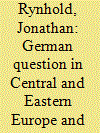

|
|
|
|
|
| Publication |
2011.
|
| Summary/Abstract |
Within the field of International Relations, theoretically informed explanations of the long peace in Europe since 1945 tend to focus on Western Europe, especially the revolution in Franco-German relations. In contrast, German relations with Central and Eastern Europe (CEE) are ignored, despite the fact that this nexus was a major cause of instability prior to 1945. This article focuses on why the German question in CEE ceased to threaten the stability of Europe after 1945. The article empirically examines the development of the German question in CEE since 1945, which refers here mainly to the Oder-Neisse line and the plight of ethnic Germans expelled from CEE after World War II. It provides a theoretically integrated and chronologically sequenced explanation. First, it argues that Realism primarily explains the successful containment of the German question in CEE between 1945 and the late 1960s. Second, it argues that the Constructivist process of cultural change, which altered German intensions, was primarily responsible for subsequently increasing the depth of peace and stability between Germany and CEE, especially after the Cold War. Finally, it is argued that prior Realist factors and Liberal processes constituted a necessary, though not sufficient, condition for cultural change.
|
|
|
|
|
|
|
|
|
|
|
|
|
|
|
|
| 5 |
ID:
101742
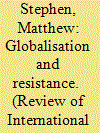

|
|
|
|
|
| Publication |
2011.
|
| Summary/Abstract |
This article develops and applies the role of 'common sense' in a Gramscian theory of transnational counter-hegemony. Building on recent interpretative literature on the alter-globalisation movement, it applies this framework to then evaluate empirically the impact of the alter-globalisation movement on the realm of global 'common sense' understandings of the world in the period 2002 to 2007. It shows that there is little empirical support for the notion that the alter-globalisation movement effected a legitimation crisis for neo-liberalism as a hegemonic project on a global scale. Instead, a more ambivalent and potentially reactionary situation amongst collectively held norms is revealed. This indicates the shortcomings of the alter-globalisation movement as a coalition of social forces capable of mounting an ideological attack on neo-liberalism and forging a new intellectual-moral bloc.
|
|
|
|
|
|
|
|
|
|
|
|
|
|
|
|
| 6 |
ID:
101747
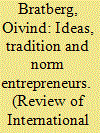

|
|
|
|
|
| Publication |
2011.
|
| Summary/Abstract |
The significance of ideas to foreign policy analysis remains contested, despite a plethora of empirical studies applying ideational frameworks. Drawing on social constructivism, this article proposes a causal understanding where ideas derived from tradition define the political space for contemporary debates and effect foreign policy behaviour. This ideational approach is substantiated by a historical study of guiding principles in British and French foreign policy, which establish a set of baseline expectations for the analysis of Tony Blair and Jacques Chirac's speeches on Iraq. The empirical study shows that whereas Chirac largely stayed within a French ideational framework, Blair applied a more complex combination of ideas from both traditions. Conceptualising Blair as an aspiring (but ultimately unsuccessful) norm entrepreneur is a fruitful interpretation of this role.
|
|
|
|
|
|
|
|
|
|
|
|
|
|
|
|
| 7 |
ID:
101736
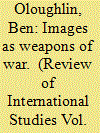

|
|
|
|
|
| Publication |
2011.
|
| Summary/Abstract |
Belief that images have become the critical 'weapon' in contemporary warfare has enjoyed great currency in the past decade. This belief rests upon certain understandings about the impact visual footage of terrorist attacks or still images of the abuse of prisoners have had on public opinion in different parts of the world. These understandings, in turn, reflect simplistic models of representation and mediation in which citizens are assumed to know little of the 'true' situation of war but are easily and primarily shocked by unexpected graphic images. To explore these relationships, this article presents analysis of original research from a three-year study of military practitioners, media coverage of security events, and collaborative audience ethnography across towns and cities in the UK. While military practitioners feel frustration that communicating with publics is 'like talking to a brick wall', analysis of audience interpretations of Abu Ghraib and other events suggests varied and negotiated understandings in which audiences account for processes of mediation as well as reflect on the event being represented. Images cannot necessarily be considered primary to explaining how an individual interprets a news story, and, to the extent and manner in which images do matter, this often depends on what longer historical narratives such images are situated within - by media or audiences themselves. No image is intrinsically shocking. For policymakers concerned with public diplomacy, for journalists and for audiences themselves there is a need for further research into the role images - Weber's 'visual language' - play amid today's conditions of diffused war.
|
|
|
|
|
|
|
|
|
|
|
|
|
|
|
|
| 8 |
ID:
101737


|
|
|
|
|
| Publication |
2011.
|
| Summary/Abstract |
What can models of interest group behaviour from American politics tell us about the existence, activities, and influence of international non-governmental advocacy organisations (advocacy INGOs) in International Relations? In this article I detail an analogy between traditional American interest groups and advocacy INGOs in order to suggest a new approach to theorising INGOs. American politics theories of interest groups provide insights to questions which International Relations has been unable to answer satisfactorily, including where INGOs are likely to be found; how INGOs will grow in the future; the organisational structure of INGOs; the impact of competing groups on the quality and content of foreign policy and international agreements; and the roles of INGOs in different stages of the policy process. Viewing INGOs as interest groups provides a curative to the tendency to view them as self-sacrificing knights in shining armour. Competing INGOs representing narrow interests can nevertheless contribute to the common good in the form of effective, efficient policy.
|
|
|
|
|
|
|
|
|
|
|
|
|
|
|
|
| 9 |
ID:
101735


|
|
|
|
|
| Publication |
2011.
|
| Summary/Abstract |
Scholars debate whether Eurocentric theories of International Relations (IR) offer useful explanations of African international politics. They also debate the applicability of Eurocentric theories of state making for understanding African state making in the post-colonial era. I argue that theories like realism and war-and-state-making appear inconsistent with African political reality because when IR scholars apply these theories to Africa, they study the wrong actors. The 'right' actors for understanding these theories include not only the official states IR scholars traditionally analyse, but also all of the autonomous political entities that control territory, possess military resources, and struggle to survive under anarchy. I substantiate my claims about the usefulness and necessity of expanding the roster of actors studied with an historical narrative of the first six years of Congo's independence. During this time six autonomous political entities, in addition to the one official state, warred with each other, allied with each other, and struggled to make states.
|
|
|
|
|
|
|
|
|
|
|
|
|
|
|
|
| 10 |
ID:
101751
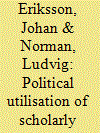

|
|
|
|
|
| Publication |
2011.
|
| Summary/Abstract |
his article discusses how and under what conditions ideas coming from International Relations (IR) scholarship are used in foreign policy. We argue that the focus on policy relevance, which dominates the IR literature on the research-policy interface, is limited. Focusing instead on political utilisation highlights types and mechanisms of political impact, which are overlooked in studies on policy relevance. The fruitfulness of this change in focus is showed in an analysis of how Samuel Huntington's 'clash of civilizations' notion and Joseph Nye's 'soft power' concept have been used in US foreign policy. George W. Bush's explicit critique and reframing of 'the clash' thesis should not be interpreted as absence of impact, but as a significant symbolic utilisation, which has helped legitimate US foreign policy. Likewise, in the few instances in which the notion of 'soft power' has been used explicitly, it has played a conceptual and symbolical rather than instrumental role. More generally, this article argues that accessible framing and paradigm compatibility are essential for political utilisation of ideas.
|
|
|
|
|
|
|
|
|
|
|
|
|
|
|
|
| 11 |
ID:
101749


|
|
|
|
|
| Publication |
2011.
|
| Summary/Abstract |
Gramscian theory has had a profound influence on critical and Marxist thought within International Relations (IR), particularly in bringing an alternative understanding to the realist concept of hegemony. Despite these developments much Gramscian theory remains developed within the often narrow sub-discipline of International Political Economy (IPE), with Gramscian scholars such as Stuart Hall, Raymond Williams and Ernesto Laclau from diverse disciplines outside of IR largely ignored. This article argues that Gramscian theory needs to be re-thought so that it moves away from the Coxian dominated ontology that it is currently situated within, towards one which both provides a more open theory of global hegemony and engages more with civil societal areas that have often been ignored by those within IPE.
|
|
|
|
|
|
|
|
|
|
|
|
|
|
|
|
| 12 |
ID:
101741
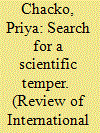

|
|
|
|
|
| Publication |
2011.
|
| Summary/Abstract |
This article examines the relationship between India's nuclear programme and its postcolonial identity. In particular, I argue that making sense of the anomalies and contradictions of India's nuclear behaviour, such as the gap of two decades between its nuclear tests, its promotion of nuclear disarmament and its failure to sign non-proliferation and test-ban treaties requires an understanding of the racially gendered construction of India's postcolonial modernity and the central roles given to science and morality within it. I suggest that India's postcolonial identity is anchored in anticolonial discourses that are deeply ambivalent toward what was viewed as a Western modernity that could provide material betterment but was also potentially destructive. What was desired was a better modernity that took into account what was believed to be Indian civilisation's greater propensity toward ethical and moral conduct. India's nuclear policies, such as its pursuit of nuclear technology and its promotion of disarmament cannot be seen in isolation from the successes and failures of this broader project of fashioning an ethical modernity.
|
|
|
|
|
|
|
|
|
|
|
|
|
|
|
|
| 13 |
ID:
101739


|
|
|
|
|
| Publication |
2011.
|
| Summary/Abstract |
Infectious disease outbreaks primarily affect communities of individuals with little reference to the political borders which contain them; yet, the state is still the primary provider of public health capacity. This duality has profound effects for the way disease is framed as a security issue, and how international organisations, such as the World Health Organization, assist affected countries. The article seeks to explore the role that domestic political relationships play in mediating the treatment of diseases as security issues. Drawing upon an analysis of the securitisation of avian influenza in Vietnam and Indonesia, the article discusses the effect that legitimacy, competing referents and audiences have on the external and internal policy reactions of states to infectious diseases, specifically in their interpretation of disease as a security threat. In doing so, we extend upon existing debates on the Copenhagen School's securitisation framework, particularly on the impact of domestic political structures on securitisation processes in non-Western, non-democratic and transitional states.
|
|
|
|
|
|
|
|
|
|
|
|
|
|
|
|
| 14 |
ID:
101738
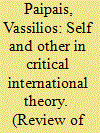

|
|
|
|
|
| Publication |
2011.
|
| Summary/Abstract |
This article is principally concerned with the way some sophisticated critical approaches in International Relations (IR) tend to compromise their critical edge in their engagement with the self/other problematique. Critical approaches that understand critique as total non-violence towards, or unreflective affirmation of, alterity risk falling back into precritical paths. That is, either a particularistic, assimilative universalism with pretensions of true universality or a radical incommensurability and the impossibility of communication with the other. This is what this article understands as the paradox of the politics of critique. Instead, what is more important than seeking a final overcoming or dismissal of the self/other opposition is to gain the insight that it is the perpetual striving to preserve the tension and ambivalence between self and other that rescues both critique's authority and function.
|
|
|
|
|
|
|
|
|
|
|
|
|
|
|
|
| 15 |
ID:
101733


|
|
|
|
|
| Publication |
2011.
|
| Summary/Abstract |
This article is interested in the impact of a singular international phenomenon, namely the global securitisation of the HIV/AIDS epidemic, on the domestic structure of three Southern African states: Botswana, Mozambique and South Africa. These countries are geographically located in the epicenter of the global HIV/AIDS epidemic, Southern Africa. However, notwithstanding their common HIV/AIDS burden, Botswana, Mozambique and South Africa present quite different political cultures and institutions which reflected upon the distinctive way they responded to the influence of international HIV/AIDS actors and norms. So, by investigating the latter's impact in these rather diverse settings, the present analysis aims to empirically demonstrate and compare variations in the effects of norm adaptation across states. To carry out this evaluation, the study provides a framework for understanding the securitisation of HIV/AIDS as an international norm defined and promoted mainly by the Joint UN Programme on HIV/AIDS (UNAIDS), the US government and transnational HIV/AIDS advocacy networks. The HIV/AIDS securitisation norm (HASN) is an intellectual attempt of the present work to synthesise in a single analytical concept myriad of ideas and international prescriptions about HIV/AIDS interventions.
|
|
|
|
|
|
|
|
|
|
|
|
|
|
|
|
| 16 |
ID:
101743
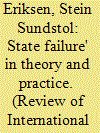

|
|
|
|
|
| Publication |
2011.
|
| Summary/Abstract |
This article provides a critique of the discourse of 'failed states', and outlines an alternative approach. It is argued that by taking the model of the modern state for granted, and by analysing all states in terms of their degree of correspondence with or deviation from this ideal, this discourse does not help us understand the nature of the states in question, or the processes that lead to strong or weak states. Instead, the idea of the state should be treated as a category of practice and not as a category of analysis. Post-colonial state formation could then be analysed by focusing on the inter-relationship between the idea of the state and actual state practices, and on the ways that states have become linked to domestic society on the one hand and their relations with the external world on the other.
|
|
|
|
|
|
|
|
|
|
|
|
|
|
|
|
| 17 |
ID:
101746


|
|
|
|
|
| Publication |
2011.
|
| Summary/Abstract |
The discourse about the morality of humanitarian intervention - though undeniably well- (over-?) trodden in recent years - has two critical gaps. First, despite its central moral concern with the rights and lives of individuals living under massively oppressive states or terrible conditions, and despite its powerful attacks on traditional notions of state sovereignty, the discourse remains statist. Humanitarian intervention understood as something that states do, and if there is a right or responsibility to intervene it is a right or responsibility held by states. The second gap in the discourse follows from the first: because we think of humanitarian intervention as something that states do, the role of the individual soldiers who make up the intervening force - their rights and responsibilities - has been undertheorised.
This article argues that a reconsideration of the role of individuals in the context of humanitarian intervention not only helps us to ensure that interventions are carried out in a manner consistent with their own justice claims, but also to recapture the moral heroism of those individuals who willingly sacrifice for the rights and lives of others. Although the moral issues raised here may demand a more constrained politics of humanitarian intervention, they also ultimately have an emancipating effect.
|
|
|
|
|
|
|
|
|
|
|
|
|
|
|
|
| 18 |
ID:
101745


|
|
|
|
|
| Publication |
2011.
|
| Summary/Abstract |
Scholars from various subfields have recognised a dangerous novelty for ethical thought on war in the combination of a detached, or virtual, technical ability to wage war and the ethical imperatives of human rights norms - deemed 'virtuous war'. This article begins by discussing the contention that the just war tradition acts as the enabling discourse for virtuous war, and the further contention that the wars being enabled are paradoxically unjust. After assessing the validity of the virtuous war claim it is argued that the just war tradition's core ethical commitment not only remains the most sound starting point for thinking about the morality of war, but is a commitment that those in the virtuous war literature suggesting alternate ethical doctrines on war implicitly reject. It is contended, though, that the addition of a third pillar to the just war structure of cause and means criteria - a justice after war or jus post bellum - has arisen due to the virtuous war reality, and is necessary in order for the just war tradition to remain committed to its core ethical principle in a 21st century marked by virtuous war. Lastly, I present a brief sketch of jus post bellum informed by the article's key claims.
|
|
|
|
|
|
|
|
|
|
|
|
|
|
|
|
| 19 |
ID:
101750
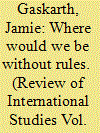

|
|
|
|
|
| Publication |
2011.
|
| Summary/Abstract |
Recent decades have seen a heightened interest in the ethics of foreign policymaking. This literature has overwhelmingly explored the ethical dilemmas faced by policymakers in terms of situations and the structures - either political/economic, normative and/or linguistic - that shape actions. The subjective experience of ethical decisionmaking in this arena and the character of the individuals making policy choices have been largely neglected. However, the apparently greater scope for moral action in the post-Cold War era, combined with the growth in global institutions designed to enforce individual accountability - such as the International Criminal Court - suggest that more effort should be placed on understanding ethics in terms of the individual. This article seeks to combine the work of political and social psychologists with the philosophical literature on virtue theory to see what new insights these might offer into the ethics of foreign policy. It argues that virtue ethics provide an effective means to critique the morality of foreign policy decisions. This is evinced by an exploration of Tony Blair's decision to go to war with Iraq in 2003.
|
|
|
|
|
|
|
|
|
|
|
|
|
|
|
|
| 20 |
ID:
101740


|
|
|
|
|
| Publication |
2011.
|
| Summary/Abstract |
Why have absolutist monarchies in the past three decades survived when so many succumbed to coups and revolution in the past? The rulers' use of divide-and-rule and balancing strategies as Lust-Okar and Jamal noted recently, served as a partial solution. Overlooked in the literature on the persistance of monarchies was how these mechanisms, which reduce the leader's domestic vulnerability, mar his offensive capabilities to cope with centralising, more effective and threatening neighbours. To cope with this trade-off between internal and external vulnerabilities, monarchs and leaders of other Third World states have been involved in a two-level game of 'omnibalancing' - allying with strong outside powers when possible while continuing to employ divide-and-rule and balancing techniques domestically. Only resource-rich or strategically located monarchies can enjoy such protection which is why most of monarchies that have persisted are located in the Middle East.
|
|
|
|
|
|
|
|
|
|
|
|
|
|
|
|
|
|
|
|
|